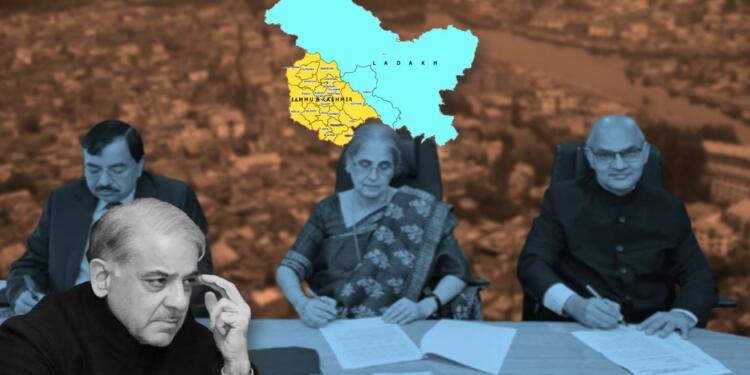A day after Delimitation Commission headed by Justice (retd) Ranjana Desai signed the historic final order on redrawing the assembly constituencies of Jammu & Kashmir – Pakistan has lost the plot. Reportedly, Pakistan’s Foreign Office on Friday summoned India’s Chargé d’Affaires and handed a demarche conveying Islamabad’s categorical rejection of the Delimitation Commission report.
The Pakistan Foreign ministry told the Indian diplomat that the Delimitation Commission was aimed at “disenfranchising and disempowering” the Muslim majority population of Jammu and Kashmir. In other words, Pakistan’s definition of ‘Kashmiriyat’ which is shared by Indian seculars as well as the Islamo-leftist cabal was being threatened by the report.
Calling the report and the exercise illegal and unilateral, Pakistan’s ministry stated, “Any illegal, unilateral and mischievous attempt by India to allow disproportionately higher electoral representation to the Hindu population to the detriment of the Muslims, is a mockery of all norms of democracy, morality and India’s obligations under the UN Security Council Resolutions and international law.”
Pakistan’s rant on India’s sovereign right is deplorable, to say the least. Pakistan fears that the delimitation exercise will clear the path for a nationalist party in the erstwhile state and will become an impediment to its nefarious agendas for the valley and beyond.
What is the outcome of the report?
As reported extensively by TFI, according to the final Delimitation Order, out of the 90 Assembly constituencies in the region, 43 will be a part of the Jammu region and 47 of the Kashmir region. Earlier, Jammu had only 37 seats in the assembly, while Kashmir was represented with 46 seats.
This imbalance helped Kashmir get overrepresented in the assembly, which is why the erstwhile state of Jammu and Kashmir has always had a Muslim chief minister, and never a Hindu one or a person belonging to other minority communities.
The new delimitation numbers are based on the 2011 Census. According to the 2011 census, the total population of the Jammu Division was 53,78,538 of which Dogras were the dominant group comprising 62.55 per cent of the population. Jammu has 25.93 per cent of the area and 42.89 per cent of the population.
Against this, the Kashmir Division population in 2011 was 68,88,475 with 96.40 per cent Muslims. Though it has 15.73 per cent of the state’s area, it holds 54.93 per cent of the population.
Read More: The Delimitation of Jammu and Kashmir paved the path for a BJP CM
J&K can now have a Hindu CM
What was inconceivable until five years ago has been made a possibility by the Modi government today – all owing to the abrogation of Article 370 and the subsequent delimitation exercise that was conducted.
Delimitation in Jammu and Kashmir had long been one of the biggest demands from the nationalists’ as they pushed for the region of Jammu to have its rightful representation and not just be the winter capital wherein politicians look for a warmer alternative amidst the icy winters of Kashmir.
The last delimitation exercise in J&K was carried out in 1995. In 2002, the then Jammu and Kashmir government led by Farooq Abdullah amended the J&K Representation of the People Act to freeze the delimitation exercise until 2026.
Consequently, to correct the wrongs of the Farooq Abdullah government — the Delimitation Commission was set up on March 6, 2020. Headed by retired Supreme Court Justice Ranjana Prakash Desai, it has the Chief Election Commissioner and J&K’s Chief Electoral Officer as members and J&K’s five MPs as associate members. The commission was granted a year’s time to come up with the report and redraw the constituencies. However, owing to Covid and a few National Conference MPs boycotting the commission proceedings meant that the first draft was only presented earlier this year in January.
Read More: Is J&K finally getting a Hindu CM? Well, the starting of delimitation exercise in J&K suggests so
What does the future behold for the UT?
It is for the Modi government to decide whether Jammu and Kashmir is to be granted conditional statehood or not, if at all. So, the BJP has time on its side. While Jammu and Kashmir remains a Union Territory, the BJP can expand its presence in the region and convince voters that it is the best alternative to corrupt dynastic parties that had thrown the erstwhile state to the dogs during their alternating periods of rule.
Pakistan will continue to reject the exercise and its ultimate outcome. However, the Indian government is completely unperturbed by its noisy neighbour trying to ratchet up the issue. The UT is moving ahead with the delimitation and Islamabad cannot do anything about it.

























